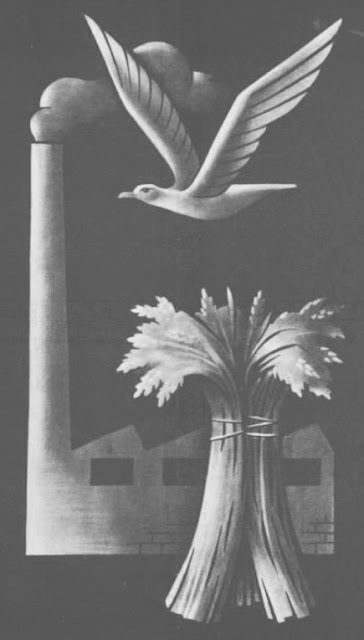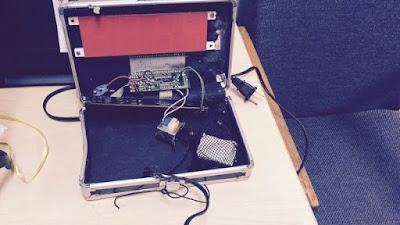A Continuing Past,
a prevailing issue,
and a Commitment to Struggle
Notes after September 21, its excesses and excuses
and its legacy of a continuing revolt from the poor
 |
"Government, Protesters, and Big Capital: The stand off"
by Jose Tence Cruz
Graphite, Tempra, Pen and Ink on Strathmore watercolour paper
Published in Who Magazine, 1983
|
"We need to make the oligarchy and Philippine big business more accountable. They can be just as oppressive and exploitative as any tyrant."
These are the words saidth by Carlos Celdran in his post, and it somehow reflects this person's view of having a rotten order such as this present.
The oligarchs, or specifically corrupt bureaucrats churning off large public accounts, as well as big landlords controlling both large estates and investing with its large stocks, has dominated the society for decades since the birth of this so-called "republic". That behind its democratic veneer is almost a totalitarian one that has two sides be it populistic or elitist, but given its repressive nature it has less to do with the people, regardless of the infrastructure, the rising economic rate, anything worth appealing to the people, sneerable both through eye and ear and conclude how successful, progressive that "New Society", or its any similar term be it "Philippines 2000" or "Strong Republic", no matter how corrupted its majority of bureaucrats and other people on high involved.
 |
"Martial Law" by Anna Fer
limited edition print, 1984
from the Bantayog ng mga Bayani Collection.
|
But at first, this writeup is all but a rambling, not just remembering those days of hatred, all after the failed "New Society" and its subsequent governments till present. And to think that Martial Law, or as what loyalists afforded to call as the "New Society" has leaned on both "Nationalist" and "Neoliberalist" inclinations, with the former in its attempt to keep firm the status quo while the latter in its mean to resolve the economic question amidst nationalist trappings. Quite contraditicting though knowing that Marcos and his successors has played both as "nationalists" while most of its policies made themselves puppets of a bigger entity. Apologetics may afforded to say that the country as in need of an ally in case of conflicts with neighbouring countries, yet, come to think of this: true that the Philippines needs allies, but how about rolling its own sleeves and forge for a greater future as what their statements said so? Remember, its neighbours were once weak, but they afforded to stand on its own; Singapore, the country in which certain individuals and groups lean upon as an example of discipline afforded to stand on its own regardless of having lack of resources and relying on outside investments, yet having a state that somehow described as "incorruptible" does economic internvention on behalf of their folk. How about the Philippines? Nope, but instead it has been obeying dictates from international moneylenders and its domestic advisers.
True that there are infrastructures made during those periods, fueled by the desire to create a facade of progress, it was, or even is, obvious to see a showcase of roads, bridges, schools, hospitals, or even airports; while at the same time cultivating arts, culture, of trying to create a "New Filipino" capable of heeding the demands of both present and the future whilst rooted on the aspirations of its own past, be it Rizal, Bonifacio, Mabini, and various heroes yearning for national and social liberation. But remember that Marcos's era, as well as its successors was also those of Thatcher and Reagan, of "Reaganomics" and "Peace through Strength" that resulted to people angry due to increasing prices if not militarisation; that behind the rhetorics of peace and stability as stated by its apologetics was those of injustice as the status quo tries to keep firm amidst growing opposition, with all its tortures, imprisonment of certain personages, or even enforced disappearances and displacement of communities particularly those from the countryside. After 1986 comes its excesses in the name of restoring order hidden beneath the veneer of "Freedom" and "Democracy" as observed by many during those times.
 |
| Painting inspired by Juan Luna's "Spoliarium" |
Admittingly speaking, people may have appreciate the infrastructure made by those times, be it the bridges, schools, roads, hospitals, anything be described as a Marcosian legacy if not a credit grabbing feat that somehow made most, if not all, criticise than appreciate for having names be inscribed till making themselves synonymous to those infrastructure left.
But on the other hand, as what apologists love to tell based on their "experiences", that it is also true and necessary to say that in a matter of survival as a community, a revival of national consciousness has to be enacted, that the youth has to cultivate national awareness in pursuit of reclaiming again National Identity and a truly profound sense of national pride different from what is usually shown in mass media.
But sadly, that reclaiming is all but aesthetic as compared to its neighbouring countries that really instill national consciousness that is, beyond music and art; ironically, that revival made some who consistently oppose even made their creativities and opposition even stronger.
And to paraphrase the statement of late Teodoro Locsin, it is true that Mentally dishonest Filipinos, particularly those of the system and its apologetics such as in social media, frequently pay lip service to human liberty, to democracy, to progress and stability; and based on what everyone observe it has even invoke further freedom of speech and the press enough to sneer people through the eye and in the ear; but inconviently speaking, it is true enough that their heart is with the totalitarian system, given their "tradition" of keeping the status quo of interest, including those of sacrificing both man and it's community's right to live and enjoy. They do not love liberty, democracy, not even progress and stability, they only make use of it, most likely a rhetoric perhaps. And if when they are in power, as what it is today and in the past, they will erase the infamy, particularly coming from those who stand in their way, be it the shantytown dweller from Tondo, the farmer from Hacienda Luisita, the worker from South Superhighway, the indigenous tribe from Bukidnon, the student from the University of the East, or even a professional who at times spent the frivolities of life at Tomas Morato after a work at Technohub in Diliman.

And no wonder why there are still protests and writeups concerning about a country's true state behind what is commonly presented.
That's all for now.


























